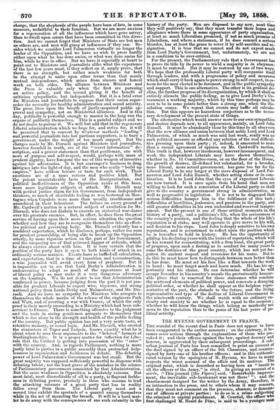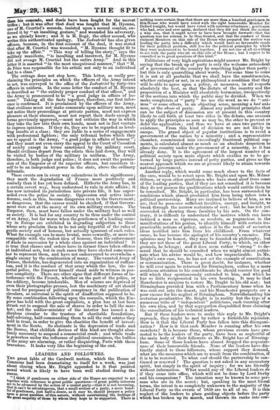TILE HYENNE GOVERNMENT IN FRANCE.
THE scandal of the recent duel in Paris does not appear to have been exaggerated in the earlier accounts ; on the contrary, it be- comes more serious through the explanations of those who pro- voked it ; and their offence against the law, against decency and honour, is aggravated by their subsequent proceedings. A sub- urban journal of Paris has been compelled to print an account of the duel signed by an officer of the 9th Chasseurs, and counter- signed by forty-one of his brother officers; and in this authenti- cated version by the apologists of M. Hyenne, we have in many respects the worst account of the affair and its motives. The original point, which is described as having been an " insult to all the officers of the Army," is cited. In giving an account of a soiree, "This journal [the Figaro] said, ' Remarkable improve- ment, the inevitable sub-lieutenant was not there' " ; and the chastisement designed for the writer by the Army, therefore, is an intimation to the press, and to others whom it may concern, that they must not comment on the presence, absence, or demean- our of officers at private parties ; to do so is a crime subjecting the criminal to capital punishment. M. Courtiel, the officer who first challenged M. Henri de Pdne, is said to be a younger 111" than his comrade, and duels have been fought for the merest trifles P • but it was after that duel was fought that M. Hyenne, one of M. Courtiers seconds, insisted upon a second combat, en- forced it by " an insulting gesture," and wounded his adversary, as we already know; and it is M. Roge, the other second, who writes this authenticated apology. The Industriel has also given offence, because, in the first account of the duel, it was stated that after M. Courtiel was wounded, " M. Hyenne thought fit to take up the affair." " This way of telling the story," says the military manifesto, "is insulting and incorrect, for M. Hyenne did not avenge M. Conrael but the entire Army." And in this letter it is asserted "in the most unequivocal manner," that " M. de Pene was responsible for his article not only to an individual but to a class."
The outrage .does not stop here. This letter, so coolly pro- claiming the principles on which the officers of the Army intend to act, was conveyed to the office of the Industriel by forty-two officers in uniform. In the same letter the conduct of -M. Hyenne is described as " the entirely proper conduct of that officer,' and the Army is pronounced to be " a goodjudge in affairs of ho- nour." Taking all the facts together, therefore, our first infer- ence is confirmed. It is proclaimed by the officers of the Army, that civilians must not make comments upon military men, must not notice their proceedings at private parties, must not express pleasure at their absence, must not report their duels except in terms previously approved,—must not criticize the way in which they take the law into their own bands, must not in fact venture to express opinions. If they do, they are to be regarded as level- ling insults at a class ; they are liable to a series of engagements with professional fighters ; the only tribunal before which they are to appeal is the Army, " a good judge in affairs of honour ; and they must not even carry the appeal to the Court of Cessation of society except in terms sanctioned by the military court. Should civilians depart from the edicts thus laid down, they will be visited by bodies of the military in uniform. The Army, therefore, is both judge and police ; it does not await the permis- sion of the Emperor or of its superior officers, but considers it- self to be an independent power in the state, above the ordinary tribunals.
These events are in every way calamitous in their significance ; they mark the degradation of France more positively and coarsely than it has yet been defined. Hitherto the Army has, in a certain covert way, been understood to rule in state affairs ; it has now intruded its jurisdiction into private life, it has super- seded even the police in society. Oppression and active inter- ference, such as this, become dangerous even to the Government; so-dangerous, that the excess would be checked, if that Govern- ment were not at the mercy of its own military creatures. The Emperor, then, must have fallen under the military heel as well as society. It is bad for any country to be thus under the control of an Army, but far worse when the gentlemen of a leading coun- try in Europe are exhibited in degrading subjection to those whose acts proclaim them to be not only forgetful of the rules of gentle society and of honour, but actually ignorant of such rules. What for example can be more brutal, more cowardly, or more in- compatible with the rudest idea of honour, than the enforcement of duels in succession by a whole class against an individual ? It is true that classes and orders have in former times taken offence at individual acts, but in such cases they have elected some mem- ber to represent them, and have not endeavoured to overwhelm a single enemy by the combination of many. The vaunted Army of France, therefore, has degenerated into an organization of ruffian- ism, and it is the conduct of that army which the law, the im- pdal police, the Emperor himself stand aside to witness in pas- awe complicity. There are other signs that different forms of in- terference with the French, whether on the part of the police, or the soldiery, become intolerable. Men of science are deprived of even their photographic presses, lest the machinery of art should be used for purposes of political conspiracy in the publication of
i circulars, so universal is the spirit of disaffection supposed to be. By some combination following upon the councils, which the Em- peror has held with the great capitalists, a plan has at last been struck out to suspend the sale of shares in order to lull the mar- ket; and the soldier-minister of the interior has issued a ri- diculous circular to the trustees of charitable foundations, half-advising, half-commanding them to sell the real estates they hold in trust, in order to give the charities the benefit of invest- ment in the Rente. So obstinate is the depression of trade and the Bourse, that childish devices of this kind are thought abso- lutely necessary to suspend a commercial crash ; and while trade is powerless under the influence of political uneasiness, the bullies of the army are alarming, or rather disquieting, Paris with these bravadoes. It looks very like the beginning of the end.



























 Previous page
Previous page